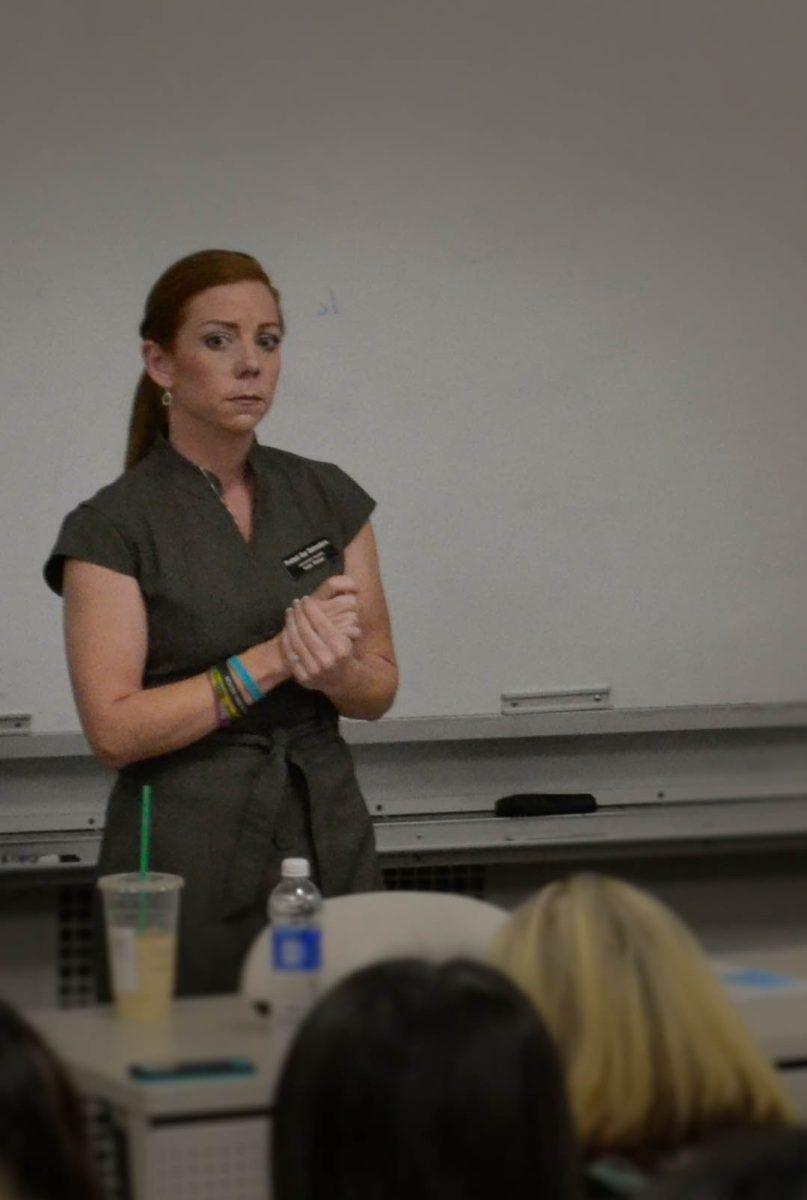Academy Awards nominee “The Invisible War,” a 2012 documentary on rape victims in the U.S. military, now hits a lot closer to home. With one of the women in the film living here in Rohnert Park, the Feminist Lecture Series at Sonoma State invited her to speak about the traumatic personal experiences she encountered and those of other females in the military.
Kate Weber, now a 39-year-old mother of four children, told the harrowing story of her rape by a fellow soldier while stationed in Germany. At the age of 18, and only two weeks after being deployed, she was asked to talk outside by another soldier who walked her up a few stories of stairs.
After she denied his advances, he physically assaulted and raped her, then pushed Weber off the railing down two stories of stairs. When she came to, Weber was in the dirt by some train tracks with her skirt pulled up. Weber said she pulled her skirt down, took a taxi back to the barracks and “took the longest shower of my life.”
Weber continued to tell of how she reached out to another woman the day after who simply told her that there was no way that was possible and that, “You’re just a private, you’re probably just a little slut.” Weber talked about how besides a written letter from a doctor who didn’t even examine her, she was dismissed by both men and women above her.
She was harassed by her peers and suffered stalking from the man who raped her. The rapist was never punished for what he did and Weber was discharged a year later for not passing a fitness test. Weber stated an opinion about the attitudes of her commanders, which she told in five words: “No one gave a shit.”
Weber continued her story of the mental and physical problems she battled and still battles with.
“After what happened to me in the military I stayed numb for a long time,” said Weber. “Only three years ago I decided to stop taking the prescribed [medications] from my [Veterans Affairs] doctors.”
Not only did Weber tell a personal story, but her entire speech was riddled with statistics of military sexual assault. From 2011 to 2012, sexual assault cases rose 34.5 percent from 19,300 to 26,300. Many believe this number to be much larger for assault victims of the military and are afraid of coming forward.
Weber explained that in the military if someone is to continuously report sexual assault they are seen as weak, harassed by their peers and suffer extreme post-traumatic stress disorder. A study shows that women who are raped while in the military have stronger cases of PTSD than other soldiers.
This problem is not just with women. One in five women in the military experience some sort of sexual assault during their service, but of all rapes in the military, 50 percent of the victims are men.
Weber has made it a personal goal to do whatever it takes to make people aware of the trauma she and many other soldiers have experienced, and to help bring about change.
“In the last six months I have had two friends commit suicide because of what happened to them while in the military,” said Weber. “I want that to stop happening; something has to change.”
Just last week Weber went to Sacramento to testify in court.
A few months ago she returned to a military base for the first time in years to speak with a group of men who were about to be deployed, and for the last few years has been interviewed and given speeches countless times to anyone that will listen.
Weber is a woman that has used her personal trauma to fuel her fight to stop it from happening to other women.
For more about this topic visit protectourdefenders.com or watch the film, “The Invisible War,” directed by Kirby Dick.
The producers, Amy Ziering and Tanner King Barklow, are now working on a documentary focused on college rape around the U.S.



































